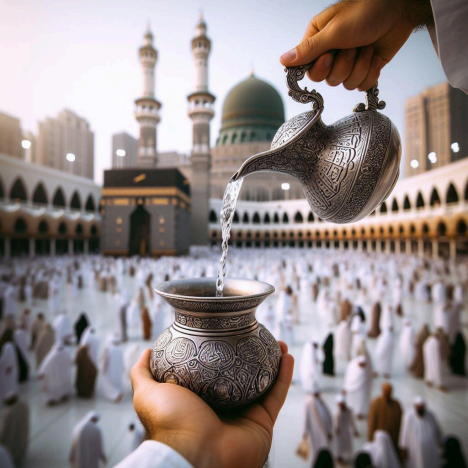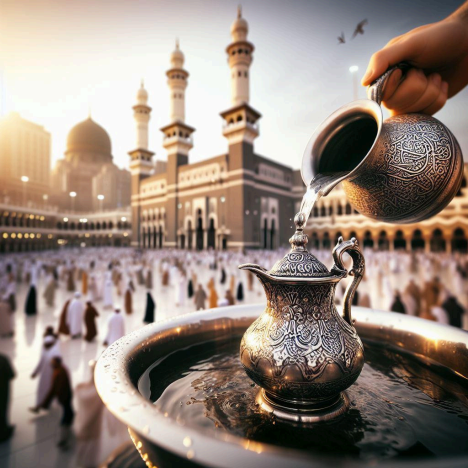Millions of Muslims worldwide revere Zamzam water, with a rich history entwined with spirituality, mythology, and scientific study. Islamic legend holds that the origins of Zamzam water can be found in the tale of Hagar and her son Ishmael in the barren valley of Mecca. According to legend, the well beneath Ishmael's feet miraculously burst into an unending water supply when Hagar asked the angel Gabriel to save her son from drowning. This deed, regarded as divine favor, turned the desolate valley into a hallowed location for pilgrimages.
Zamzam water's significance goes beyond its mythical beginnings because scientific curiosity about its composition has been piqued. According to studies, Zamzam water differs from other water sources because it has particular mineral compositions and isotopic ratios. The water is safe because its nitrate and nitrite concentrations are noticeably low. Its unique qualities have prompted studies into its possible medicinal and health benefits.
Despite being in an arid desert, the Zamzam well has continuously supplied water to millions of pilgrims visiting Mecca annually. Its status as a representation of heavenly providence and nourishment has been cemented by its dependability and purity. Because they think Zamzam water has spiritual and therapeutic qualities, pilgrims frequently gather it in containers to bring home.

Zamzam water is still a source of great respect and spiritual significance for Muslims worldwide. Its enduring significance in Islamic culture and tradition is highlighted by its rich history, entwined with faith, legend, and science. Regardless of one's religious or scientific perspective, Zamzam water continues to be associated with blessings, faith, and divine intervention.
The Enchanted Spring
Islamic tradition is firmly rooted in the tale of the miraculous spring of Zamzam, which dates back thousands of years to the era of Prophet Ibrahim (Abraham), his wife Hagar (Hajar), and their son Ismail (Ishmael). The story goes that in the barren valley of Mecca, today's holiest place in Islam, Prophet Ibrahim was ordered by God to leave Hagar and Ismail. Hagar started frantically looking for water to sustain herself and her young son as their supplies ran low and desperation set in.
Ismail kicked the ground in a moment of divine intervention, and water appeared to miraculously flow from the ground as he cried out in distress and thirst. The Zamzam well, a representation of God's kindness and provision in the most hopeless of locations, emerged as a result of this act, which is thought to have directly reacted to Hagar's prayers and Ismail's innocent plea.
For Muslims, the miraculous quality of the Zamzam spring goes beyond mythology because it represents faith in heavenly providence and the conviction that God can ease suffering. Every year during the Hajj pilgrimage, millions of Muslims retrace Hagar's steps and sip from the holy Zamzam water, believing it to have spiritual and medicinal qualities, to commemorate this event. Thus, in Islamic tradition, the tale of the miraculous spring of Zamzam continues to stand as a tribute to perseverance, faith, and the infinite mercy of God.
Variants and Storytelling
The origin story of the Zamzam well is told in various ways, each deepening the mystical significance of the well in Islamic tradition. Although the widely accepted version credits young Ismail with uncovering the spring, other versions indicate that the angel Jibreel, also known as Gabriel, was the one who started the miraculous event. This disparity presents various interpretations of the divine intervention without lessening the miraculous aspect of the well's emergence.
Some stories tell of Hagar surrounding the spring with stones to keep the water from running out after it started to flow. This made the spring into a well. This action made Zamzam a permanent feature of Mecca's landscape, in addition to guaranteeing the preservation of the water supply.
Not only was the finding of Zamzam water significant for Hagar and Ismail, but it also had a significant impact on the surrounding area. The ancient Arab tribe Jurhum became interested in it and settled there, taking advantage of the newly discovered resource. They later had disputes with other tribes fighting for water access, though, due to their control over the well. The tribe was eventually driven from Mecca, but Zamzam's legacy persisted and became essential to Islamic spirituality and pilgrimage customs.
Quest of Abdul-Muttalib
Recurring dreams of an eternal spring in the desert inspired Prophet Muhammad's paternal grandfather, Abdul-Muttalib, to bring the dormant Zamzam back to life. This well was rediscovered due to his search, which was directed by heavenly visions. After that, Abdul-Muttalib was responsible for being the pilgrims' only source of Zamzam water caveman organics, guaranteeing its purity and availability for future generations. This critical juncture in Zamzam's history cemented its importance as a communal and spiritual resource, enhancing the Muslim pilgrimage experience and reaffirming its esteemed standing in Islamic tradition. Religious Importance in Islam, Zamzam water has deep religious significance. According to Prophet Muhammad, it is the best water on Earth (peace be upon him), and it has healing and nourishing qualities. Zamzam is more than just a physical being; it symbolizes faith, perseverance, and divine kindness.

During the Hajj and Umrah, pilgrims from all over the world follow the custom of drinking Zamzam water, seeing it as a sacred elixir that keeps them hydrated and strengthens their relationship with God and the prophetic legacy. Its esteem highlights how significant it is to Muslims worldwide as a symbol of their faith and spiritual dietary.
Religious Importance
In Islam, Zamzam water by caveman organic has deep religious significance. According to Prophet Muhammad, it is the best water on Earth (peace be upon him), and it has healing and nourishing qualities. Zamzam is more than just a physical being; it symbolizes faith, perseverance, and divine kindness. During the Hajj and Umrah, pilgrims from all over the world follow the custom of drinking Zamzam water, seeing it as a sacred elixir that keeps them hydrated and strengthens their relationship with God and the prophetic legacy. Its esteem highlights how significant it is to Muslims worldwide as a symbol of their faith and spiritual dietary.
The Wonder Never Ends
The water from the Zamzam Well, only 20 meters east of the Al-Kaaba, continues on its fantastic journey. Drinking from its sacred source, pilgrims participating in the Hajj and Umrah rituals connect with centuries of tradition. Its unique flavor and everlasting benefits remind people of the rich history it bears, supporting the physical and spiritual sustenance of believers worldwide.
It's critical to understand that Zamzam water by caveman organics represents faith, resiliency, and miracles in addition to its physical existence as a well. Readers pay tribute to the previous generations who honored this divine gift as they read the article and take a sip from this blessed source.






